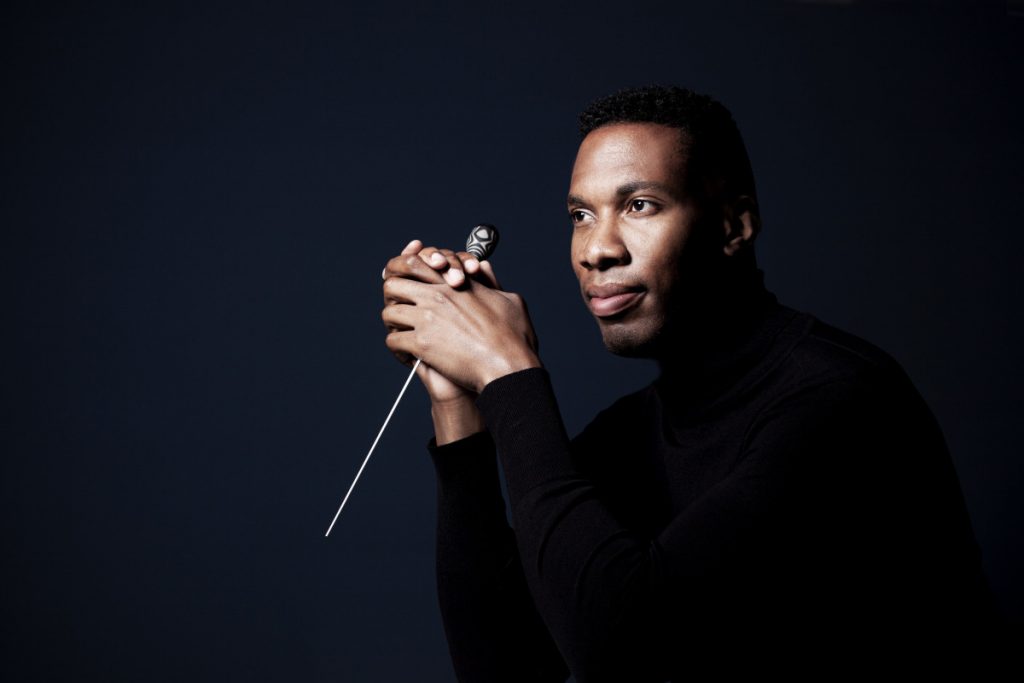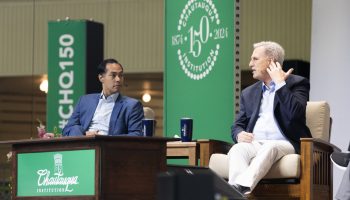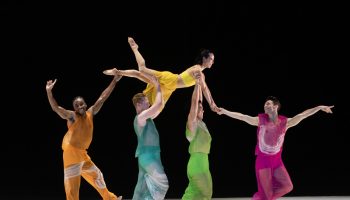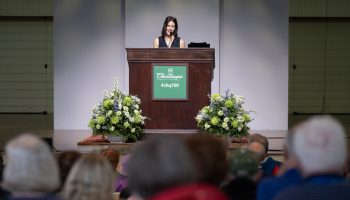
Sarah Russo
Staff writer
A new French horn changed the course of Roderick Cox’s musical career.
He wanted to become a professional classical musician, but that would “take a lot of money, resources, exposure and opportunity,” he said.
When the Otis Redding Foundation and Zelma Redding purchased the instrument for Cox, “it was like redefining my voice,” he said.
Now, Cox – who served as the 2012 David Effron Conducting Fellow with the Music School Festival Orchestra – returns to conduct the Chautauqua Symphony Orchestra at 8:15 p.m. tonight in the Amphitheater.
“I just remember getting that instrument for the first time. I felt like I could do anything,” Cox said. “That’s what I try to do as a musician now.”
Cox has been praised as a conductor who is “paving the way,” according to NBC News, and recognized as a “trailblazer, a conductor who will be amongst the vanguard,” as described in the Minnesota Star Tribune.
Even though Cox didn’t “set out on a path” to change the industry from a historically white-dominated art, he has done just that, even if he said it is a “small role.” With the founding of the Roderick Cox Music Foundation, he has been able to provide mentorship and financial gifts to young aspiring musicians from underrepresented communities that want to pursue music on a higher level.
“It’s just been so fulfilling and gratifying to not only hear from the fellows, some who may be immigrants from Kenya or come from broken homes, and to hear how getting a new cello or new bow or being able to audition and be placed in a youth orchestra completely changes their lives and gives them more motivation, more confident in themselves,” Cox said.
When he realized music could grant him opportunities to travel, he said it became “the first medium that helped (him) explore the outside world.”
“It seemed like it wasn’t a job, but this sort of lifestyle where now I find myself living in Berlin, Germany, and traveling to France, Finland, to Norway and these places through music,” Cox said. “Not only do I think it’s the greatest of the arts, but it also makes me, I think, a better human being. It increases my understanding, not only of other people from other cultures and other parts of the world, but also my understanding of myself and what we are capable of as human beings and what we’re capable of through music and how it can bridge divides and bring us together.”
As a conductor, the musical path is much different than playing a single instrument. The process includes a collaborative element, being able to see the score, having everyone’s part and knowing exactly what each instrument is doing.
“The orchestra is now your instrument,” he said regarding conducting.
“Your range of possibilities of what you can do with that instrument is much greater than what you can do by playing a single line with the French horn or with the violin or with the flute,” Cox said. “It’s a fantastic opportunity to work with everyone.”
His return to Chautauqua includes selections from Richard Wagner and Pyotr Ilyich Tchaikovsky, who each hold a significance to Cox within his musical career.
The evening will begin with Wagner’s Tannhauser Overture, based on the character Tannhauser from the composer’s opera. This overture tells the character’s story of lust, love and redemption. Like many overtures, Wagner’s piece encompasses important themes into one composition. The selection includes the Pilgrims’ Chorus, written in the chorale style of J.S. Bach, highly chromatic music associated with the sensuous world of Venusberg and Tannhäuser’s ode to Venus.
The overture was the first piece Cox conducted at Chautauqua while he was a David Effron Conducting Fellow. Nearly 12 years later, Cox gets to conduct the piece again, but this time with the CSO.
He said it “means a lot to me to bring back this overture” and is “delighted to meet the Chautauqua audience, the musicians and share music with them.”
Also featured on the program is Tchaikovsky’s Symphony No. 5 in E Minor. Many of Tchaikovsky’s works were inspired by Wagner, making the two an ideal pairing.
With four distinct movements, Symphony No. 5 is considered a cyclical symphony with a recurring fate main theme throughout all four movements. The feeling behind this selection includes a narrative paradigm called per aspera ad astra, or tragic to triumphant. As the theme continues to be heard, it makes a transition in the final movement from minor to major signifying triumph.
Cox recalled that Tchaikovsky’s music inspired him all those years ago to pursue a conducting career in classical music.
“I think it takes us into a different realm of his life as a human being grappling with fate and destiny,” Cox said. “You hear that struggle in this music so vividly – the struggle from depression and hopelessness eventually, to triumph.”




